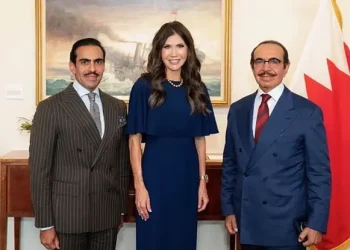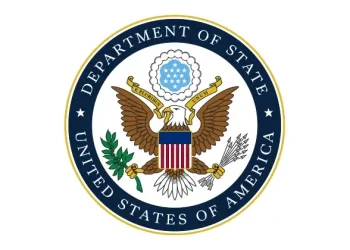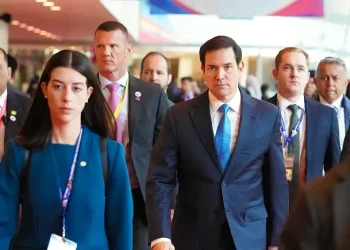The US government has announced a sweeping new round of sanctions targeting Iran’s oil trade and Hezbollah’s financial networks.
This move, part of a broader “maximum pressure” campaign, aims to disrupt billions of dollars in illicit revenue that fuels terrorism and regional instability.
The sanctions, coordinated by the Treasury and State Departments, focus on oil smuggling operations, “shadow fleet” tankers, and key financiers supporting Iran and its proxies.
Targeting Iranian Oil Smuggling Networks
At the heart of the new sanctions is a crackdown on sophisticated networks smuggling Iranian oil in violation of international restrictions.
The Treasury’s Office of Foreign Assets Control (OFAC) has blacklisted dozens of companies and individuals, including Iraqi businessman Salim Ahmed Said.
Said’s network has, since 2020, disguised Iranian oil as Iraqi crude using forged documents and bribed Iraqi officials to facilitate sales to Western buyers.
These operations use ship-to-ship transfers and blending techniques to mask the oil’s origin, helping Iran evade sanctions and access global markets.
The profits have directly benefited Iran’s Islamic Revolutionary Guard Corps-Qods Force (IRGC-QF), a US-designated terrorist organization. The US estimates that these networks have moved billions of dollars’ worth of oil, undermining efforts to restrict Iran’s access to critical funds.
Disrupting the “Shadow Fleet”
A major focus of the sanctions is Iran’s so-called “shadow fleet”—a collection of tankers and shipping companies that covertly transport sanctioned oil.
These vessels often turn off their tracking systems and use complex routing to avoid detection. Among those sanctioned are ships flagged in countries like Panama, Cameroon, and the Marshall Islands, as well as management companies in the UAE, Seychelles, and Singapore.
The shadow fleet’s activities pose both economic and safety risks. By operating “dark,” these ships endanger other vessels and make it harder for authorities to track the flow of sanctioned oil.
The US has identified and blocked property interests in several tankers, including the VIZURI, FOTIS, THEMIS, and BIANCA JOYSEL, each responsible for transporting millions of barrels of Iranian oil.
Cracking Down on Hezbollah’s Financial Infrastructure
In parallel, the US has sanctioned seven senior officials and one entity linked to Al-Qard Al-Hassan (AQAH), a Hezbollah-controlled financial institution in Lebanon.
AQAH has long been a key part of Hezbollah’s financial network, enabling the group to move millions of dollars through “shadow” accounts and evade sanctions.
The targeted officials have managed AQAH’s operations for decades, opening joint bank accounts and conducting mirrored transactions to disguise Hezbollah’s involvement.
This activity exposes Lebanese banks to anti-money laundering and counter-terrorism financing risks, further destabilizing Lebanon’s already fragile economy.
The US is also offering rewards of up to $10 million for information leading to the disruption of Hezbollah’s financial mechanisms, underlining its commitment to dismantling the group’s funding sources.
Historical Parallels
These actions build on years of US efforts to isolate Iran economically. Since the reimposition of sanctions in 2018, following the US withdrawal from the Iran nuclear deal, Washington has repeatedly targeted Iran’s oil and petrochemical sectors.
Executive Orders 13902 and 13846 provide the legal framework for these measures, allowing the US to sanction foreign entities that knowingly facilitate Iranian oil sales.
Historically, similar sanctions have forced Iran to rely on increasingly complex smuggling tactics and proxy networks. The use of shadow fleets and front companies reflects a pattern seen in other sanctioned states, such as North Korea and Venezuela.
Human Impact
The sanctions have significant human and economic consequences. In Lebanon, Hezbollah’s financial activities have contributed to a banking crisis, eroding public trust and complicating recovery efforts.
For ordinary Iranians, the loss of oil revenue has led to budget shortfalls and reduced government services, fueling domestic unrest.
In Iraq and the Gulf, officials implicated in bribery and smuggling face legal and reputational risks. International shipping companies and insurers must now navigate stricter compliance requirements, increasing costs and operational uncertainty.
Enforcement and Compliance
The US warns that all property and interests of designated persons in the US or controlled by US persons are now blocked. Any entity owned 50% or more by sanctioned individuals is also blocked. US and foreign companies face strict liability for violations, with potential civil or criminal penalties.
Financial institutions are urged to review transactions for links to sanctioned entities and report suspicious activity. The US has signaled it will enforce secondary sanctions against foreign banks that facilitate significant transactions for Iran or Hezbollah.
In Conclusion
The latest US sanctions mark a significant escalation in efforts to cut off funding for Iran and Hezbollah. By targeting oil smuggling networks, shadow fleet vessels, and financial operatives, Washington aims to disrupt the revenue streams that support terrorism and regional instability.
The message is clear: the US will continue to use every available tool to hold Iran and its proxies accountable, protect the integrity of the global financial system, and promote security in the Middle East.
Sources: US Department of the Treasury and US Department of State.
Prepared by Ivan Alexander Golden, Founder of THX News™, an independent news organization delivering timely insights from global official sources. Combines AI-analyzed research with human-edited accuracy and context.








